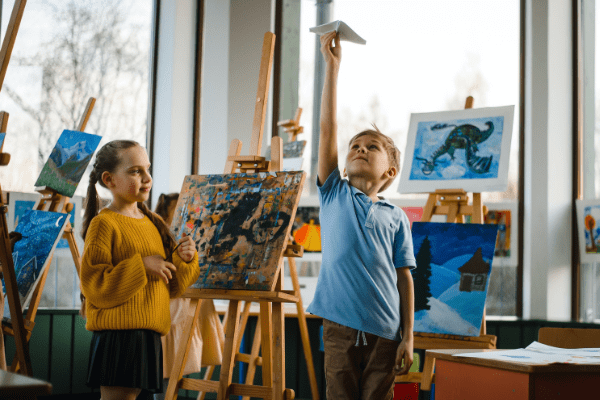Coles, Westpac and ANZ and are some of Australia’s largest advertisers to commit to The Unsteretype Alliance, a worldwide coalition to fight harmful stereotypes in advertising and media content, with the Australia chapter launched by UN Women this week.
These advertisers join a larger group signing on for the Alliance and promising to work towards diversity and inclusion across the advertising materials they put out, with Google Australia, Unilever, Optus and Salesforce also jumping on board.
The Unstereotype Alliance, which was founded in 2017, is a thought and action platform that combines the influence of the advertising, media, and marketing communities as a tool to change perceptions and stereotypical ideas about gender.
UN Women, the United Nations entity for gender equality, hopes the Alliance will empower people of all gender, races, classes, ages, abilities, ethnicities, religions, and sexuality, by using advertising as a force to drive positive change.
The Australia National Chapter launched with 21 businesses in the advertising and media community signing up, all with the aim of securing actionable commitments to make changes.
Sima Bahous, Under-Secretary-General of the United Nations and Executive Director of UN Women, commended the founding members for embracing the mission and using advertising to eliminate harmful stereotypes in the media.
“Representation of our community in advertising and media content is critical to creating an equal and open society. One of the best ways to ensure that is to have representation across the advertising, marketing, tech and media industry.”
“This group of leaders is coming together to enact real, meaningful change that will impact Australia for the better.”
The Australian chapter will be led by Unilever, IPG, Mars, Westpac and Coles.
The Australian advertising industry contributes roughly AU$17.3 billion in spending to drive AU$40 billion to the country’s economy while employing over 200,000 people.
In the last 18 months, the COVID-19 pandemic has exposed inequalities in the Australian advertising landscape, highlighting ongoing social and economic injustices that disproportionately impact minority and marginalised groups.
Simone Clarke, CEO UN Women Australia believes leveraging the reach of the United Nations’ will provide a global connectedness for members with a shared commitment to achieving the Sustainable Development Goal 5 for gender equality.
“The National Chapters drive change at a local level, responding to culturally driven stereotypes, social norms and attitudes,” she said. “Australia is the tenth National Chapter, in addition to Brazil, Japan, India, Kenya, Mexico, South Africa, Turkey, UAE, and UK.”
Founding members and corporate allies include Accenture, Bayer Australia, Coles, Diageo Australia, Facebook Australia, Google Australia, IKEA, IPG, Ipsos Australia, Mars Australia, Mastercard Australia, Omnicom, Optus, Publicis Groupe, Salesforce, Snap Inc., Suncorp, Unilever ANZ, WPP AUNZ and the Australian Association of National Advertisers.
Sunita Gloster, chief executive of Gloster Advisory, explained in an opinion piece for Sydney Morning Herald how advertising is a force for normalizing beliefs and values.
“If an idea has reached a mainstream ad for a mainstream brand, it must be mainstream,” she wrote. “The diversity dividend is real. Businesses know diversity fuels growth. Those who lack the spine are handbrakes on change.”
In its fourth year now, the Unstereotype Alliance has been behind notable achievements such as mandating ‘unstereotyped’ judging criteria as part of industry award programmes including Cannes Lions.
It has also developed best practice guidelines and measurement tools to help marketing teams create more progressive communications that don’t rely on harmful stereotypes.
Unilever CEO of Australia and NZ, Nicole Sparshott said her company had a responsibility and an opportunity to dismantle the stereotypes that perpetuate bias.
“We reach so many people every day, with our brands, through our products and our communication,” she said. “We must be a voice for all individuals, not just a few.”
Anathea Ruys, CEO of UM Australia, and the representative for IPG, said that her company’s values must be reflected in their daily actions – “…from the teams we build, to the content we put into the world.”
“It is our responsibility to our people, clients, consumers and community to challenge the dangers of stereotyping in advertising and media,” she added. “We’re excited to expand our partnership with UN Woman on the Unstereotype Alliance as a chapter launches in Australia. In doing so we’re honouring the richness of humanity.”
Coles’ chief marketing officer, Lisa Ronson, said the The Unstereotype Alliance is critical to Australia right now because the right conversation around harmful gender stereotypes showing true diversity in advertising and communications has started.
“It’s up to Australian business leaders to take it to the next level and truly embed diversity in our communications to reflect an authentic view of Australian society & our customers,” she said.
Head of Brand and Advertising at Westpac Jenny Melhuish, said that along with Australia’s rich diversity, “it is imperative we see this authentically featured and celebrated in our advertising, acknowledging and being proud of diversity and inclusion of the Australian community.”


